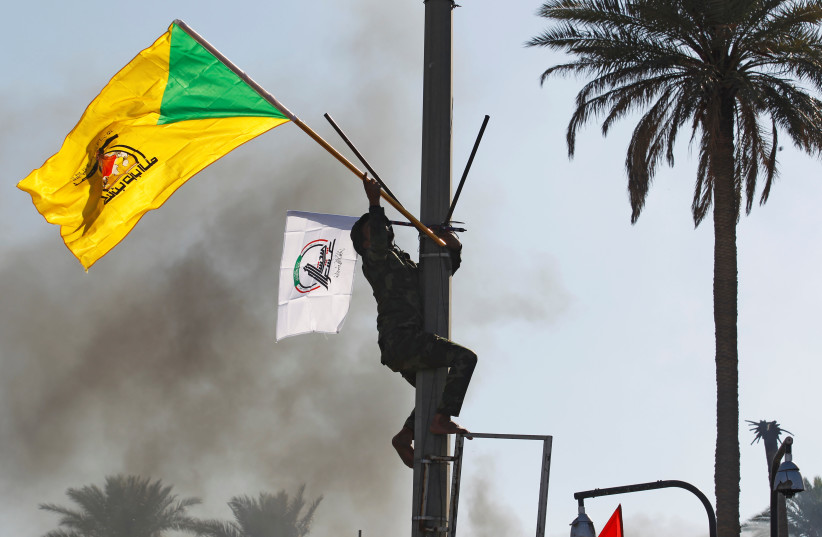Six months ago, on March 21, US-based researcher Elizabeth Tsurkov, the daughter of Soviet political prisoners and a dual Israeli and Russian citizen, was kidnapped in Iraq. The kidnapping of the Princeton doctoral student was reported by the Prime Minister’s Office only in July, which announced that she was being held hostage by the Iraqi Shi’ite militia Kataib Hezbollah. In September Amnesty International and other organizations called for her release.
In response to questions from the Jerusalem Post, former Soviet prisoner Natan Sharansky said “the Iraqi government has to feel it is their responsibility because, after all the organization that kidnapped her is a part of the government. ” Sharansky, imprisoned on spy charges for nine years and more recently a minister and chair of the Jewish Agency, is familiar with the kidnapping of Tsurkov. “Together with her father I spent a lot of years in Soviet prison. In my book Fear No Evil about the prison you can read a lot about him. Her father and mother were political prisoners in the Soviet Union from a very young age.”
Now their daughter is being held in Iraq. “To the best of our knowledge - she is alive,” he said. “The Iraqi government is responsible. The Iraqi government receives much financial assistance from America. Liza [Tsurkov] came for research from Princeton University and was very positive toward the people of Iraq and the Muslim world in general. It is legitimate and natural to expect the US administration to exploit their relations with the Iraqi government.”
Iraqi Prime Minister Shia’ al-Sudani is discussing US-Iraq relations at the Council on Foreign Relations on Thursday in New York City in the context of the United Nations General Assembly meeting. The Iraqi leader’s presence has been spotlighted because of the Tsurkov affair.

PBS (the Public Broadcasting Service) hosted a discussion about Tsurkov last week, noting she has been missing for six months. “She was conducting research for her doctoral degree in Baghdad when she was believed to have been kidnapped by an Iraqi militia. Amna Nawaz spoke with her sister, Emma Tsurkov, about efforts to bring her home.”
Sudani has not addressed calls for Baghdad to find and release Tsurkov, but met with NATO Secretary-General Jens Stoltenberg in New York this week and invited him to visit Iraq, in appreciation for “NATO’s support in the fight against ISIS, military training, advice, and capacity building,” according to a statement posted on social media by Iraq’s government.
Sudani has also met with White House Coordinator for the Middle East and North Africa Brett Mcgurk on the sidelines of the 78th session of the UN General Assembly.
“They discussed overall relations between Iraq and the United States and ways to strengthen and develop them at various levels and fields, in a way that serves the interests of the two friendly nations,” the Iraqi Prime Minister’s office said in a statement.
Calls from congress for Tsurkov's release
The Iraqi leader also met with Kuwaiti and Iranian delegations.
The Associated Press noted in an article that Emma Tsurkov has called for more pressure to get her sister released. “The United States should use its influence,” to secure her release “by an Iran-backed militia regarded by Washington as a terrorist group,” she told the Associated Press. “The current level of pressure is unsatisfactory. It’s just not enough... My sister is languishing at the hands of this terror organization. And it’s been almost six months.”
In Amnesty International’s call for Tsurkov’s release, “New Lines Magazine reported that she was in Iraq conducting field research on Shia movements in Iraq when she was kidnapped in the Karrada neighborhood of Baghdad. Her family said that she had emergency spinal surgery to treat a herniated disc eight days before she was abducted.”
According to the PBS broadcast, Congressman Eric Swalwell and Senators Robert Menendez and Cory Booker have asked the State Department to do more, saying it appears inexplicable that a country that receives support from the US would not be able to find a missing researcher connected to a prestigious university such as Princeton. In addition it is not the first time Kataib Hezbollah and other militias in Iraq, many of them linked to Iran, have been accused of extrajudicial kidnappings and attacks.
Asked if enough was being done to release Tsurkov, Sharansky said, “It is never enough until she is released.” He said it was important to focus on Iraq. “In the days of the struggle for the Soviet Jewry, my position always was that quiet diplomacy can be successful only if there is public pressure at the same time.”
Media attention has diminished since the kidnapping became known in July. “People don’t forget, but it is the nature of the media to report only when something is happening. And it is a constant struggle to keep one or another case at the center of attention. No doubt the academic world in the US, especially Princeton University, could do more because one of their students was kidnapped,” Sharansky said. “Her family – parents, sisters, and brother are trying to do their best for Liza, and I appreciate highly what they are doing.”
In the interview with PBS, Emma Tsurkov said, “It seems that, so far, everyone is passing the buck. Everyone wants to know what’s happening, but no one wants to take the lead and take the responsibility of doing everything possible to bring my sister back. She’s an amazing, kind, brilliant person, and she doesn’t deserve this. She doesn’t deserve this.”
